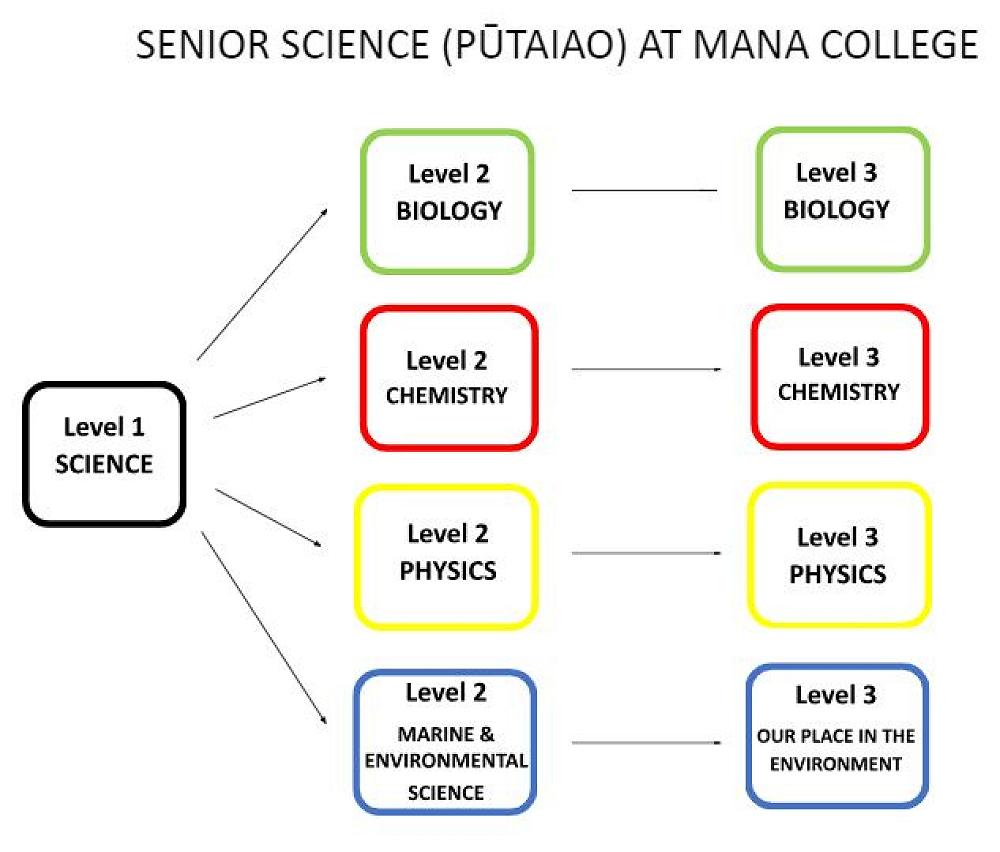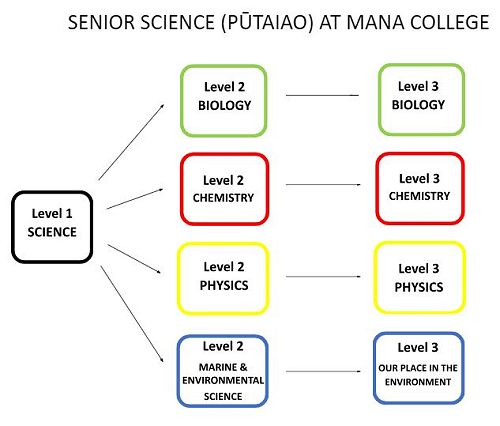
Learning Area: Science
LEARNING AREA: SCIENCE
SCIENCE: NCEA LEVEL 1 (Strongly recommended)
Course description: Science is the study of the world around us. This course will look at the investigative process, researching & forming opinions on socio-scientific issues, features of Science and how to identify misinformation in a Science context. In Level 1 Science we will be covering a broad range of concepts from Biology, Chemistry, Physics to prepare students for life outside of school as well as science courses in year 12, 13 and at tertiary level. It is useful for students considering almost any career. Topics at Level 1 include pests & biodiversity, the interactions between sport and science (including the effectiveness of different technologies), and how we can use science alongside indigenous knowledge to solve various problems.
Possible pathways: This course can be taken alongside all other subjects. It leads into Level 2 Biology, Physics and Chemistry. Science provides the first steps towards careers working with animals, in medicine, engineering, building and construction, food technology, environmental science and many others.
NCEA credits available: Students will complete 20 Achievement Standard credits available - 10 internal and 10 external.
Exclusions: None
BIOLOGY: NCEA LEVEL 2
Course description: This course covers a range of topics from the Living World including cellular processes, genetics and ecology. Students will study life at the microscopic level, learn about adaptations of plants and animals to their way of life, and carry out biological research.
Possible pathways: Biology is a recommended subject for many tertiary level courses including nursing, medical science and environmental science, and strongly recommended for Level 3 Biology.
NCEA credits available: There are 13 Achievement Standard credits available internally and 8 credits via the external examinations.
Exclusions: None, but it is recommended that students have completed Level 1 Science.
CHEMISTRY: NCEA LEVEL 2
Course description: This course provides students with a solid grounding in a range of chemical concepts and their application in different situations. Topics focused in this course include atomic structure, chemical bonding, organic chemistry, energy and speed of reactions. Students will also develop an ability to carry out a range of practical techniques associated with these topics.
Possible pathways: This course is a prerequisite for entry into Level 3 Chemistry which is essential for getting into courses leading into many careers e.g. nursing, medicine, pharmacy, physiotherapy, engineering etc.
NCEA credits available: Students could gain up to 19 Achievement Standard credits at NCEA Level 2 consisting of 10 internals and 9 externals.
Exclusions: None, but it is recommended that students have completed Level 1 Science.
PHYSICS: NCEA LEVEL 2
Course description: Physics is the study of motion, matter, energy, forces and waves. Level 2 Physics covers a range of topics, including mechanics, nuclear physics, and applications of nuclear physics in medicine and the generation of electricity. Physics has a practical component while also helping students develop greater skills in researching and carrying out calculations.
Possible pathways: Physics leads into engineering, electrical and mechanical apprenticeships, medicine, architecture, construction industries, computing and many others.
NCEA credits available: a possible 20 Achievement Standard credits at Level 2, with internal (10) and external standards (10).
Exclusions: None, but it is recommended that students have completed Level 1 Science. Students should have a good grasp of Mathematics, especially algebra and graphing.
MARINE AND ENVIRONMENTAL SCIENCE: NCEA LEVEL 2
Course description: This is a course for students with an interest in sustainability, the local environment and Marine Biology. It will look at local issues and the species living in our marine environment, as well as exploring how humans affect ecosystems and considering personal values in relation to the living world and taking action.
Possible pathways: Students interested in pursuing careers in Ecology, Environmental Sustainability, Aquaculture, Fishing, Geology and Local Politics will find this course useful, as well as students who have a strong interest in being kaitiaki for our local and global environment.
NCEA credits available: Students will be offered a range of Science, Education for Sustainability Achievement Standard credits and some students may be able to complete a PADI diving qualification, subject to availability.
Exclusions: None. This course can be taken with other Level 2 Science courses.
BIOLOGY: NCEA LEVEL 3
Course description: This is an Achievement Standard course and covers a range of topics from the Living World. These include ecology, speciation, human evolution, socio scientific issues, manipulation of genes and homeostasis.
Possible pathways: This course provides a background for University Biology papers. It is possible to gain University Entrance Biology or combine the credits from this subject with Chemistry or Physics to gain University Entrance Science. It is suitable for students considering a range of careers, e.g. nursing, health science, medical science and environmental science.
NCEA credits available: Students can gain up to 13 internal credits and 8 external credits.
Exclusions: None, but it is recommended that students have completed Level 2 Biology.
CHEMISTRY: NCEA LEVEL 3
Course description: This course expands on content covered in Level 2 Chemistry and covers the theory and practical applications to build on the understanding of key concepts and phenomena relating to the synthesis and properties of organic compounds, Spectroscopic analysis, Electrochemistry and, Structure and Thermochemistry of particles.
Possible pathways: This course is a UE approved subject and leads to entry into many science tertiary courses and careers e.g. nursing, hairdressing, chef, engineering, medicine, pharmacy, physiotherapy, dentistry etc.
NCEA credits available: Students could gain up to 23 Achievement Standard credits at NCEA Level 3 consisting of 13 internals and 10 externals. A Merit or Excellence endorsement is possible.
Exclusions: None, but it is recommended that students have completed Level 2 Chemistry.
PHYSICS: NCEA LEVEL 3
Course description: This course delves deeper into L2 concepts such as the generation of nuclear power and testing Physics theories, and also covers new phenomena such as waves and quantum theory. It has both practical and theoretical components, and will involve research and investigation based internal assessments. Topics covered will be Modern Physics, practical investigations, the choice of Mechanics and/or Waves externals, and the debate of whether we should introduce Nuclear Power to Aotearoa.
Possible pathways: This course is a UE approved subject. Physics leads into medicine, engineering, electrical and mechanical apprenticeships, architecture, construction industries, computing and many others. Taking a combination of Chemistry and/or Mathematics with Physics is helpful.
NCEA credits available: Students could select from a range of standards offering up to 23 Achievement Standard credits at NCEA Level 3 (13 internal and 10 external). Students will be able to gain University Entrance.
Exclusions: None, but it is strongly recommended that students have completed Level 2 Physics and have a sound grasp of Mathematics. If Level 2 Physics was not taken in 2023 Learning Area Head approval is required.
OUR PLACE IN THE ENVIRONMENT: NCEA LEVEL 3
Course description: This course is designed to explore our place in the living world. This includes how we respond to the environment, how we can safely explore the living world and our responsibilities towards it.
Possible pathways: Environmental Sciences or Social Sciences. Public Policy and Outdoor Education.
NCEA credits available: In discussion with the students who select this course, Achievement standards will be selected from Education for Sustainability (10 internal credits, potentially 4 external) and or Science/PE standards (6 internal).
Exclusions: None
Gallery

